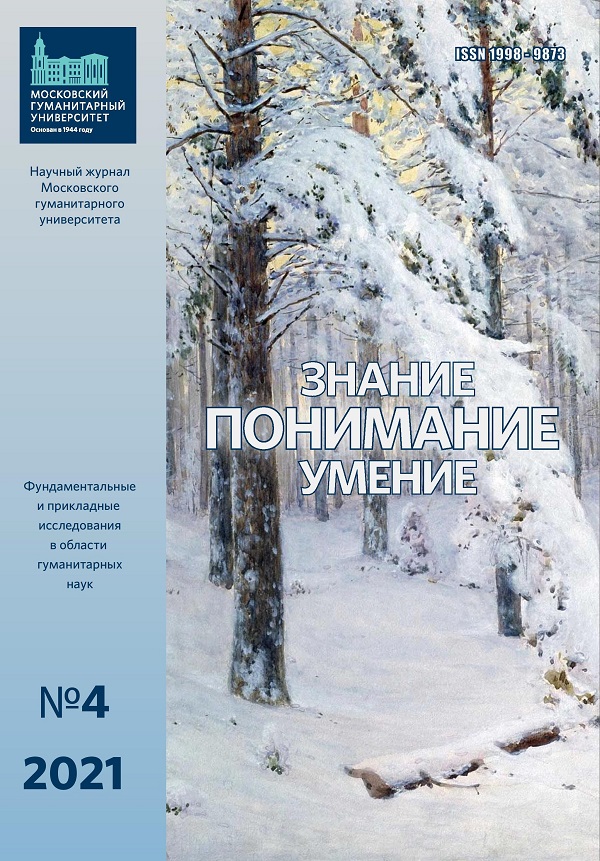Main page / "Knowledge. Understanding. Skill" Journal / Contents / 2014 / No. 3
Menyaeva M. P. N. F. Fedorov’s Philosophy of the “Common Cause” through the Lens of the Idea of the “Culture of Concord”
(Chelyabinsk State Academy of Culture and Arts)
Abstract ♦ The article analyzes the philosophy of the “common cause” by Nikolai F. Fedorov through the prism of the culture of concord.
Out of a range of meanings of “concord”, we have created our own definition of the “culture of concord” and singled out its topicality. The culture of concord unites the forms of human relations which are based on concord and thus provide unity. The relations of this kind are expressed through solidarity, mutual help, support and acceptance. They are based on tolerance and mutual concessions, presupposing benevolence, selfless love and care for each other.
The subject remains topical, especially in the context of increased estrangement and discord between people, their neglect of ancestors. Such was the diagnosis of humanity’s condition according to N. F. Fedorov (1828–1903), the founder of Russian cosmism in its religious version.
We provide the analysis of Fedorov’s philosophy of the “common cause”, including its foundations, prerequisites, declared goals and the means of achieving them. The philosopher has emphasized the special role and significance of Russia in the project. According to Fedorov, the “common cause” includes the philosophy of universal action in order to control and regulate the natural forces to create and regenerate life.
The “common cause” project comprehended the significance of kinship and brotherhood of people both on the humanity-wide global and individual levels. N. F. Fedorov emphasized the latter idea in the context of thinking about his own life.
Keywords: Nikolai F. Fedorov, culture of concord, concord, philosophy of concord, the “common cause” project, Russian cosmism, humanism.
Menyaeva Marina Petrovna, Candidate of Culturology, Assistant professor, Department of Philosophical Studies, Chelyabinsk State Academy of Culture and Arts. Postal address: 36-à Tsvillinga St., Chelyabinsk, Russia, 3454091. Tel.: +7 (3512) 263-89-73. E-mail:
mieniaieva73@mail.ru

Citation: Menyaeva, M. P. (2014) Filosofiia «obshchego dela» N. F. Fedorova cherez prizmu idei kul'tury soglasiia [N. F. Fedorov’s Philosophy of the “Common Cause” through the Lens of the Idea of the “Culture of Concord”]. Znanie. Ponimanie. Umenie, no. 3, pp. 102–107. (In Russ.).
Submission date: 16.07.2013.
RUSSIAN VERSION
REFERENCE
Kozhevnikov, V. A. (1908) Nikolai Fedorovich Fedorov. Opyt izlozheniia ego ucheniia po izdannym i neizdannym proizvedeniiam, perepiske i lichnym besedam [Nikolai Fedorovich Fedorov. An Attempt to Present His Teachings According to His Published and Unpublished Works, Correspondence and Personal Conversations]. Moscow, Imperial Moscow University Press. iv, 320 p. (In Russ.).
Ozhegov, S. I. and Shvedova, N. Yu. (1994) Tolkovyi slovar' russkogo iazyka: 80000 slov i frazeologicheskikh vyrazhenii [Dictionary of the Russian Language : 80,000 Words and Phraseological Expressions]. Moscow, AZ"" Publ. 928 p. (In Russ.).
Fedorov Nikolai Fedorovich (1995) In: Russkaia filosofiia: slovar' [Russian philosophy : A Dictionary] / ed. dy M. A. Maslin. Moscow, Respublika Publ. 655 p. Pp. 531–532. (In Russ.).
Fedorov, N. F. (1995) Vopros o bratstve, ili rodstve, o prichinakh nebratskogo, nerodstvennogo, t. e. nemirnogo, sostoianiia mira i o sredstvakh k vosstanovleniiu rodstva [The Issue of the Brotherhood, or Kinship, of the Reasons for Un-brotherly, Non-cognate, i.e. Non-peaceful, State of the World and the Means to Restore the Kinship]. In: Fedorov N. F. Sobranie sochinenii [Collected Works] : in 4 vols./ comp., text processing and annotations by A. G. Gacheva and S. G. Semenova. Moscow, Progress Publ. Vol. 1. 518 p. Pp. 35–308. (In Russ.).
|
|
|
 The No. 4 2021 of the
The No. 4 2021 of the
Journal "Knowledge.
Understanding. Skill"
is issued
|
|
|
|